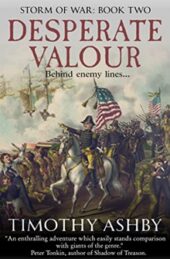Sharpe’s cavalry sword is still being sheathed into the guts of his enemies. Harper’s volley gun is still reverberating like thunder. Wellington is still grumpy. The British army can still fire three shots a minute. And the word “bastard” still litters the air like confetti. In short, all is well with the world.
Sharpe’s Assassin will please the fans of the series and hopefully pick up a fair few new devotees. We are in the aftermath of Waterloo. The war is won, but the battles may still not be over. Napoleon has been defeated, but not everyone has received the memo – and there are pockets of fanatical, or folly-full, resistance. Sharpe is dispatched to Paris, to investigate and put down a possible conspiracy. Intrigue and action abound as Sharpe and Harper hunt – and are hunted by – their enemies throughout the streets of the French capital. As is the tradition of other Sharpe novels, Cornwell gets his hero to a gripping battle in time at the end. Watch for papercuts as you quickly turn the pages. There are also plenty of flashes of humour, as well as musket fire, throughout the prose: “The Frogs don’t have liberty, they certainly aren’t equal, so fraternité is all that’s left to the poor darlings.”
It is a credit to Cornwell’s writing – and the actor’s past performances – that one can’t help but picture Sean Bean (and hear his voice) when reading the novel. His tousled hair. His rough stubble and roguish manner. The audience are welcoming back a familiar friend. If only our gas suppliers could be as dependable as a Sharpe novel.
Look around you in any bookshop (at the shelves of titles by the likes of Simon Scarrow, Conn Iggulden and Ben Kane) and you shall see Bernard Cornwell’s monument. There are other templates for writing commercial historical fiction, but few work as well or have influenced a generation of authors. Cornwell is a master of pace and precision. Unlike too many other novelists, historical or otherwise, he never uses ten words when two will suffice. Which is not to say that Sharpe’s Assassin is devoid of detail or research.
We cannot be sure if this will be our hero’s last outing, but should this novel be your introduction to Richard Sharpe then you have taken your first step on a thoroughly enjoyable journey. I can wholly recommend the rest of the series. Indeed, reading any Cornwell series is a worthwhile, rewarding campaign.

Richard Foreman is the author of Crusaders, Band of Brothers and Spies of Rome.






